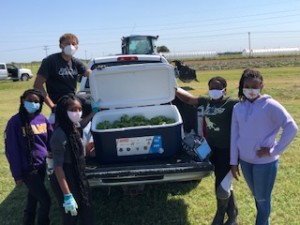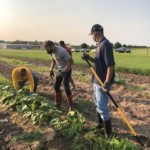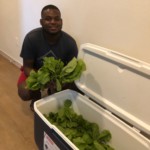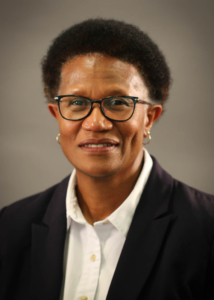 October 12 – The Student-led Garden is taking on a new look this year as it has expanded to include other PVAMU student organizations. According to student garden leader, Dillan Davis, a Senior Agriculture major, “it is important to include other students in the garden to reap the benefit of growing their food. A lot of college students complain about not having fresh fruits and vegetables. This gives the student a great opportunity to get hands-on experience”.
October 12 – The Student-led Garden is taking on a new look this year as it has expanded to include other PVAMU student organizations. According to student garden leader, Dillan Davis, a Senior Agriculture major, “it is important to include other students in the garden to reap the benefit of growing their food. A lot of college students complain about not having fresh fruits and vegetables. This gives the student a great opportunity to get hands-on experience”.
Jaylin Lewis, another student garden leader, believes that agriculture is life. She added, “the student garden has helped me better understand all aspects of agriculture and how vital the growing and handling stages of plant life is to not only the plant itself but the consumers as well. To ensure the quality of produce, what we do before shelf life is very critical. Having the opportunity to receive this kind of exposure in knowledge and hands-on experience is very valuable and a great way to invest in students’ future”. During the first interest meeting, Dillan encouraged all student organizations to commit to maintaining a row. Groups such as Kappa Alpha Psi, Women in Stem, the Honor’s Program, the Haus (Modeling Club), the Pre-Vet Club, MANRRS, and the Student Garden Club. Also, Praise Benson, a Community Development graduate student and a CAHS May 2020 graduate decided to commit to participating in the garden activities. Friday, October 2, 2020, student organization representatives plucked the freshly grown mustard greens and provided this produce for students who live in Phase IX.
The produce was delivered to Phase IX by Princess Pinamang, Women in STEM President, and a member of the Honor’s Program. Charles Carpenter, a Junior Agriculture major and Project TLC Student-led Garden co-leader. CAHS Professor and Research Scientist, Richard W. Griffin, Ph.D., and CAHS Director for Undergraduate Research, Laura Carson, Ph.D., lead the program. Both believe the students who participate in the garden this year will better connect their classroom discussions due to the hands-on experiential learning practices. According to Griffin, students who participate can expect to learn how to plant, calculate germination percentage, irrigate, fertilize, cultivate, identify insects and diseases, apply organic focused pest controls, engage in manual and natural weed controls. They will also harvest, monitor yield weights, distribute fresh and naturally managed to produce to eager consumers, and plan the new crops grown in the next planting cycles.
Laura Carson, Ph.D.
Director of Research Compliance and Undergraduate Research
Research Scientist
lecarson@pvamu.edu
(936) 261-5010



